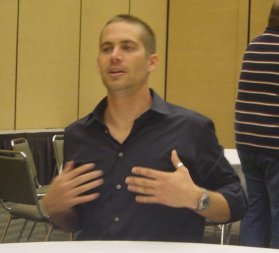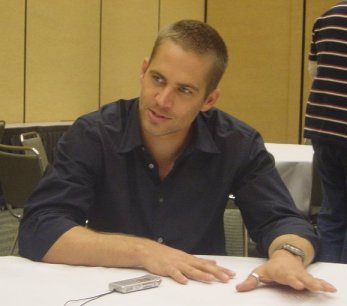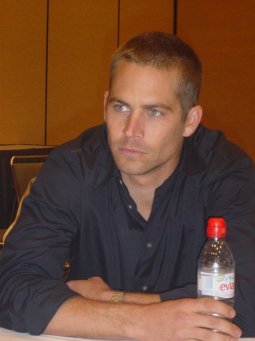
Like its big brother in San Diego, WonderCon has begun attracting attention as a way for studios to get the word out about upcoming projects. Saturday ended up being as much about movies as comics, with presentations on films both big (Superman Returns, Cars) and small (Brick, Running Scared). The day also brought out the stars, and we got the chance to sit down with two — writer/director Wayne Kramer, who had attracted attention with The Cooler a couple of years ago, and Paul Walker.
Let me state for the record that in person, Paul Walker is a very powerful personality. Those penetrating eyes, that easy smile hiding a hint of danger, and a way of really working the room all add up to — yes, this guy could have been Superman, even with a reputation of being somewhat wooden onscreen. In person, he’s anything but.
being somewhat wooden onscreen. In person, he’s anything but.
And by many accounts, his performance in Kramer’s newest film, Running Scared, will change his onscreen reputation. Merging dark fairy tale elements (without the supernatural) with a high-octane mob story, the film hinges upon Paul Walker’s character being pushed to the edge and beyond.
Walker and Kramer sat down with a small roundtable of three reporters: Rebecca Murray of About.com, Peter Canavese of Grouchoreviews.com and Mario Anima. I took pictures, because somebody had to. Special thanks to Rebecca and Peter for their cooperation and their assistance in getting this piece put together.
Press: Was there ever a point where you almost got an NC-17?
Wayne Kramer: Yeah.
Press: How did you keep them from doing that?
Wayne Kramer: You know, you can negotiate with them and say, “Look, you’re being too harsh. The film’s going to be darker than what you’re seeing.” You know what tends to happen is that you become so cynical of the MPAA that you over-shoot your movie to some degree. You kind of like throw your first cut out there and you kind of see what sticks and what pisses them off.
And you know the one thing I can say is that I ended up with the cut I wanted of the film. It’s an R rated film and that’s great. On any given day, because they’re so arbitrary, they could have decided to be NC-17. I think I just caught them in a good mood, good time of the month (laughing).
Press: Was there any interference from studios or production companies to try and cut back on either the violence or the nudity? Wayne Kramer: No, not really. Even when we sold the film to New Line there was really never an issue about that. Initially the financing company had some reservations about the pedophile scene. But I said, “No, this is going to be a winner,” you know.
Paul Walker: That’s my favorite scene.
Wayne Kramer: And you know we stuck by it. But everybody who bought into this movie knew it was going to be a very sort of ballsy experience.
Press: In the production notes it says you think this character’s closer to Paul than anything else he’s played, is that really a quote from you?
Wayne Kramer: Yes.
Press: Why?
 Wayne Kramer: (Laughing) Because he’s a tough MO, you know. I like to say he’s not the laidback sort of surfer. I mean he is that guy on some level but he’s not really. He’s a tough guy. I would not like to be on the wrong side of him in a barroom fight, you know?
Wayne Kramer: (Laughing) Because he’s a tough MO, you know. I like to say he’s not the laidback sort of surfer. I mean he is that guy on some level but he’s not really. He’s a tough guy. I would not like to be on the wrong side of him in a barroom fight, you know?
People think they’re going to stand up to him. It’s like the Sean Connery as James Bond thing – people always challenging him. I think if people decide they’re going to challenge the guy from The Fast and the Furious or one of these lighter comedies he’s done or something, I think they’re going to find they’re facing down Sean Connery.
Paul Walker: You just created a whole bunch more trouble for me (laughing).
Press: How do you feel about that? Is this character closer to you than anything you’ve played?
Paul Walker: Yeah, I think it’s probably the closest thing to me, to be honest with you. I mean the opposite is what, East Coast/West Coast thing. But I think attitude and that sort of thing, I think, you know, there’s no way I would have gone at it if I didn’t feel like there’s a lot of me in it. There’s definitely more of me in it than not.
I think on the outside what people see and what I present, especially when I’m doing press, but what they’ve seen in movies they’ve seen the friendly like nice guy, which I like to think that I am. But I definitely have a dark side. I think everybody does.
Press: In some ways it’s also probably the most challenging work you’ve done. How did you prepare from the ground up – the accent, the physicality of the character? Paul Walker: My lifestyle’s active. Attitude is attitude, whether you’re a West Coast gangster or East Coast gangster, you know? I grew up in the Valley and, you know, it’s mixed racially. I had Latino friends. I had black friends. And they thought they were thugs. A lot of them weren’t half the thug they thought they were, always getting into trouble.
But I know the attitude. I know the personality. My dad’s a biker and all the guys he comes around, most of them have got priors. They’ve been in and out of the joint, you know?
Wayne Kramer: This is what I’m talking about (laughing).
Paul Walker: Those are the guys I grew up around so there’s a lot to pull from. And then you know I worked with Chazz Palminteri. He’s in this movie and I worked with him on Noel. You know, he’s got his mobster crew buddies out there.
 Wayne Kramer: Arthur Nascarella…
Wayne Kramer: Arthur Nascarella…
Paul Walker: Yeah, Arthur. I had guys to pull from at any given time. If there was ever a time I wasn’t comfortable with what I had to say, they were right there. They were the bullshit police for me, which was great. I grew up on gangster movies. I loved the mobsters, man. I mean growing up as a kid it was cowboys and Indians and it was mobsters. That’s an American childhood, you know. Those are the movies you grew up on.
Press: (A) hard R sensibility – what were some of the seminal films in that respect. Also, following up on that, there’s a theme in the film of satisfaction of revenge is very visceral. What are you feelings about the interaction you get there with an audience?
Paul Walker: I’ve always said that this film is very interactive. I’ve been to a couple of audience screenings and I can tell you the beats where they start like talking back to the screen and the whole pedophile scene, you can just start to feel sort of the anxiety building and sort of the silent chanting which then becomes vocal like, “Do it, do it. Do it!” You know what I mean?
I totally miss these kinds of movies that are these visceral, adrenaline rush experiences because Hollywood has become about the PG-13 watered-down film. And I remember growing up and seeing The Warriors and even 48 Hours was a tough movie. You know, we think of it more as comedic today but that was an R rated, just for the language itself. And the Peckinpah stuff and Scarface, which is a classic. And I felt like the momentum of a movie like Carlito’s Way, you know having to make it through the night and stuff like that. Dirty Harry…
Press: Charles Bronson?
Wayne Kramer: Oh yeah. It’s definitely got a Charles Bronson vibe. I don’t want to sound cheesy at all here when I mention this example of a movie that kind of seemed like wired through my brain on a subconscious level but it was a Steven Seagal movie, Out For Justice, you know where it takes place over the course of a night and he’s got to find the guy who’s killed his buddy. I’ll tell you, that is a bad ass movie, that movie.
Paul Walker: I like Steven Seagal shit.
 Wayne Kramer: You know to me that was the last like really real movie he made. They called it Out for Justice but I remember that movie’s original title was The Price of Our Blood. I thought that would have been a much better title.
Wayne Kramer: You know to me that was the last like really real movie he made. They called it Out for Justice but I remember that movie’s original title was The Price of Our Blood. I thought that would have been a much better title.
Press: Without giving anything away, was the ending that we saw the only ending that you shot or was there an alternate version?
Wayne Kramer: No. I get asked that question a lot and it was the only ending. And it’s interesting. In retrospect I’ve questioned whether that was the approach. But you know what? In the moment in watching that movie it’s such a brutal sort of…the audience just gets thrashed around and dragged through this. I always felt as a filmmaker, and I knew I made the right decision again last night, that it’s so intense an experience to just end up in a dark place where for the sake of being very noir about it or something like that I just think would have worked against this film because of how much you’re rooting for this guy and the situation, and enough people, enough blood gets spilled and it’s kind of like a dark fairy tale.
I do think it ends kind of well but probably with scars. We don’t know where that relationship is going and a lot of things, so it really was the only ending. But it could have worked definitely in another way and it was just… I know a lot of people probably think, “Well this is the studio forcing me to take that approach,” but I do tend to be a kind of a resolved ending kind of guy. You know if, and I say this, if a certain revolution was not made toward the end of the movie then I think a darker ending might have been more fitting for it.
Press: You also mentioned that the ending of the film is a release after so much pent up – almost claustrophobic – intensity.
Wayne Kramer: Yeah. It’s a really intense experience that, even I as the filmmaker who has lived with this film for a long time, when I see it I feel the audience going through it. I mean it really takes no prisoners in its approach. I liken the film to kind of like a primal scream.
Once Paul’s character realizes what’s happening it’s just bam, bam, bam, you know and I love watching his performance in the movie. It’s the most exciting thing for me about the film because there’s a crazy madness that plays in his eyes where he’s just crossed the line at some point. He’s in this woman’s apartment. She’s holding the baby and he’s yelling in her face. I really believe this man is fighting to save his life, his future, his family and everything else. There’s an intensity that Paul brings to it that I doubt another actor could have come through the door with.
Press: Did you take this guy home with you every night?
Paul Walker: Every night.
Press: How did you live with that?
 Paul Walker: I’ve never been the guy that brought anything home but when you’re forced to just reach certain levels… I mean, the only way to sell adrenaline and flying high is just to go there. You live it day in and day out. You can’t shut that off. I’d go home trembling. A girlfriend of mine came up to visit and she planned on spending some time with me. She spent four days with me and went home. She’s like, “You’re just too intense.” I couldn’t relax.
Paul Walker: I’ve never been the guy that brought anything home but when you’re forced to just reach certain levels… I mean, the only way to sell adrenaline and flying high is just to go there. You live it day in and day out. You can’t shut that off. I’d go home trembling. A girlfriend of mine came up to visit and she planned on spending some time with me. She spent four days with me and went home. She’s like, “You’re just too intense.” I couldn’t relax.
Wayne Kramer: For every scene up on the screen he’s really doing ten times on the day, so the amount of adrenaline that he’s having to manufacture is amazing.
Press: Paul, you’re a parent. I wonder what that brought to the experience of playing this guy?
Paul Walker: My family’s really close. My father’s like… Growing up as a kid, let’s put it this way. You know kids. As boys, you would engage in “Oh, my dad’s tougher than your dad. My dad has a shotgun. My dad has this…” You know? I wouldn’t even hold back. I was like, “My dad would kill every one of your dads.” I knew it.
My father’s a protector. My father’s old-school. He’s a cowboy. He’s not much when it comes to words of wisdom and just the pat on the back, he’s not very good. He’s a drill sergeant. He’s a Vietnam Vet. This is the mentality, this is the household I came up in.
So when I see it, it’s like… Hey look, people are going to think I’m sick and I’m twisted but when I read it I don’t think that there was anything that was unjustified. I’m sorry but this guy dug himself a hole and he dug his family a hole in the process. He’ll be damned if anything is going to happen to him. And besides, who’s he smokin’? Who’s he whacking along the way? They’re bad guys. The world isn’t going to miss them. So the whole way I’m going, “Yeah, yeah, yeah, do it!” I’m reading this thing, I’m going, “Yeah, fucking kill that guy!”
The pedophiles? If she didn’t smoke them, come on. That’s my favorite scene in the movie and the best thing about it is that the people who don’t get it, absolutely hate it. They go, “That scene just completely came out of left field.” I’m like, “You’re missing the point because that’s the whole idea.”
That’s my favorite scene. When I read it I said to Wayne, I said to Vera, I said, “I’m so jealous of you. That’s the most memorable scene in the movie.”
Press: Did you feel paternal to your young co-stars?
Paul Walker: Oh yeah, especially to the parents. I mean, they signed on to it knowing what they’re getting themselves into but still, you know, that’s got to be tough. I wanted to make it very clear that I understand what’s going on here and I understand that you’ve accepted the environment that basically your kids are going to be in for the next while, but just know that I’m sensitive to it and I’m great with kids.
I come from a huge family. I’ve got nieces, nephews. I’m Peter Pan. Shit, I feel like I’m 12, 13 years-old anyway (laughing) so I’m going to get along just fine with these kids and so my whole point was, and I thought it was really important, was let’s stay focused. We have a job at hand here but I’m sensitive to the fact that these kids are out of school, they’re away from friends. I’ve got a football. I’ve got a soccer ball. I got everything.
 And you know what? It’s good, too, because I establish, I build a rapport with these kids; I want them to feel comfortable around me. And who’s to say Joey Gazelle wouldn’t go toss the football with Oleg anyways so it all plays in.
And you know what? It’s good, too, because I establish, I build a rapport with these kids; I want them to feel comfortable around me. And who’s to say Joey Gazelle wouldn’t go toss the football with Oleg anyways so it all plays in.
Press: Last night when you introduced the film, you said this guy is a director you’d work with again and again and again. What’s so special about him?
Paul Walker: He’s such a great guy. First and foremost, that’s the most important thing to me. I’ll work with a great guy that maybe even hasn’t proven himself before I’ll work with the asshole that’s sold it time and time again. You know, you live once. I want to enjoy things. But to find balance that he’s got, it doesn’t happen. He’s Fincher – he’s any of those guys.
I think Wayne’s going to blow up. He’s going to make a lot of great movies in the course of who knows how many years. I just hope to be involved in a lot of them.
You know, I’m a pretty mellow guy. I’m pretty easy-going. I see everyone’s perspective. I see everyone’s side so I’m a pretty good mediator on set when tensions are flying. That guy is tenacious and he fights. I think we complement each other in that respect. I’m pretty good at soothing him and mellowing him out, but at the same time I want to give him just enough so when it’s crunch time, when we’ve got five minutes left to get a shot he’s going, “Fuck you! I’m getting this damn shot!” I’m going, “Yeah!,” in the back. I’m rooting but at the same time when I see it getting out of control I can step up and say, “Hey look…”
I think we work well together. Nobody messes with this guy’s movie. Nobody messes with his movie.
Press: The balance that you’re speaking of in regards to children…the themes are very dark. You’re dealing with pedophilia and violence. It’s an interesting contrast that you also have another film out – Eight Below. How did you deal with balancing those two different roles? One’s a family film and this is a very different project.
Paul Walker: Well I did Running Scared, what, close to two years ago now. Wayne cut together the trailer for AFM, trying to sell the damn thing. I was so excited, hot off the presses, I run home, I show my mother. She just about started crying. She says to me, “You know what would be great? If you could make a movie that you can take your nieces and nephews – not to mention your daughter – to.”
Two weeks later to the day, Disney offered me the  script. Fuck, I didn’t want to go make Snow Dogs. I’ve already seen that. When I read it I was like, “Oh my god, this is Old Yeller.” I liked it and I got it, so I was like, “Hell with it.” I’m off the hook. Tomorrow I get to take my daughter, all my nieces and nephews, the whole family to the premiere. It’s one premiere I’m actually looking forward to going to. This is the first time, to be honest with you.
script. Fuck, I didn’t want to go make Snow Dogs. I’ve already seen that. When I read it I was like, “Oh my god, this is Old Yeller.” I liked it and I got it, so I was like, “Hell with it.” I’m off the hook. Tomorrow I get to take my daughter, all my nieces and nephews, the whole family to the premiere. It’s one premiere I’m actually looking forward to going to. This is the first time, to be honest with you.
Press: What was it like working with all those dogs?
Paul Walker: It was great. It was cool. I love dogs. If you like dogs, you get it. If you don’t, you don’t get it.
(Paul was briefly called away while we focused on Wayne Kramer.)
Press: Paul said you’re really tenacious and that he balanced you out. Do you think you’re a good combination?
Wayne Kramer: Yeah. You know, I loved working with him because as a director he’s completely supportive of my vision of what the film is. And even better, he’s completely game for it. There’s certain actors I might have started down the path with had I done the movie with them, and as the movie gets more and more intense I think they might have backed down and said, “Wayne, I think this is a little extreme.”
What I love about him is he just goes for it. And every time I thought he’d come to me behind the camera after the scene and go, “You know, I think we’re crossing the line here” or something, he’d be like… He’d come over to me and go, “This is so fucked up!” and he’d be like laughing. We’d be conspiring together.
I mean, I don’t think anyone should take this movie seriously. There are subtexts to it about violence and children getting exposed to violence and parenting issues and the evils of this world, but at the end of the day you know it’s gritty entertainment. It’s not making too much of a political commentary on the world and it’s visceral. It’s entertaining but I don’t think this violence translates into real life where somebody goes and sees Running Scared and walks into a post office and shoots down people.
 It’s pure visceral sort of… It’s not unlike a game like Grand Theft Auto you know where you’re going through these obstacles to achieve an objective.
It’s pure visceral sort of… It’s not unlike a game like Grand Theft Auto you know where you’re going through these obstacles to achieve an objective.
Press: I want to commend you about the natural kid talk in this movie and just kind of ask you to speak to working with those child actors for one thing, and also that theme that you were referring to of playing off of fairy tales and using that style element.
Wayne Kramer: I knew it was going to be challenging to find the right kids to be believable because if the kids did not work, I mean if it turned into Project Greenlight or something, the movie would fall apart. And initially the challenge is is any parent out there going to let their kid do this movie? And it turned out there were a lot of them.
The parents also understood that we were not going for something exploitive in a sense that the kid was going to be uncomfortable. Even the most controversial scene in the film you never see anyone touch a kid. You don’t see a kid without their clothes on. It’s really implied but the tone is there. It’s gritty and it’s dark and these kids are thrown into a violent, Grimm’s fairy tale nightmare. And I thought that played really well.
The subtext became more apparent to me as I was heading towards production. I said to myself one day, “You know what I’ve got here? It’s a Grimm’s fairy tale canvas.” Like the pimp is the Mad Hatter and the hooker is the Blue Fairy. The Dez and Edele house is the gingerbread house and they’re the witches.
I like tried to evoke that with like the silhouettes in the window in the bathroom. The music… All of it is very hallucinogenic. And using hand crank camera to accentuate moments of tension and violence and just the color palettes.
My cinematographer James Whitaker who worked with me on The Cooler, too, I just think he does an amazing job in creating like this bruised look to the film. Like these damaged characters that populate this universe.
But if you did not get any of that subtext I think you still enjoy it as a straight mob thriller if you’re a fan of the genre. We do try to tie it together with the animated title sequence at the end where it takes you back through moments of the film but this time in a very overtly Grimm’s painted way.
Press: As the writer, how much do you allow these guys to go off the script?
 Wayne Kramer: Well that’s the thing. As a writer/director, once I put on the director’s hat then I’m the director and I’m going to do what’s best for the scene so I do give my actors a lot of leeway. When I want them to stick to a very particular line, I will emphasize that.
Wayne Kramer: Well that’s the thing. As a writer/director, once I put on the director’s hat then I’m the director and I’m going to do what’s best for the scene so I do give my actors a lot of leeway. When I want them to stick to a very particular line, I will emphasize that.
But you don’t get a really from the gut kind of performance if you try to restrain them. And one of the things about this film is that it’s a crazy primal scream and if you set actors loose with no brakes, you’re going to get the level of profanity. You know, I mean it was a pretty profane script to start with but I think it doubled on screen and that’s because I’m not stepping in there in moments of extreme tension or anger and saying, “You’ve got to dial it down.” I just want them to go with what comes out. The film is exhausting and intense and Paul goes to such lengths but that’s because I was never putting the brakes on him.
It was funny. There was an actress in a scene who came to me and said – she was wearing a night dress or a gown or something and she said, “You know, is it a problem if my nipples are showing from beneath here?” And I said, “No. Why would that be a problem?” And they’re so used to doing PG-13 movies where that’s such a consideration, you know?

